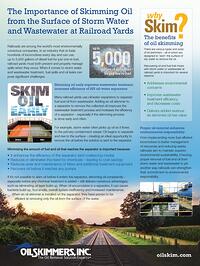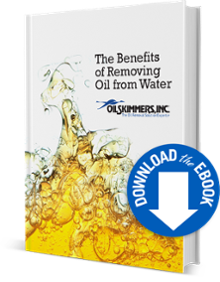 Railroads are among the
world’s most environmentally conscious companies. In an industry that re-fuels hundreds of locomotives every
day and can use up to 5,000 gallons of diesel fuel for just one re-fuel, railroad yards must both prevent
and properly manage spills when they occur. When it comes to storm water and wastewater treatment, fuel
spills and oil leaks can pose significant challenges.
Railroads are among the
world’s most environmentally conscious companies. In an industry that re-fuels hundreds of locomotives every
day and can use up to 5,000 gallons of diesel fuel for just one re-fuel, railroad yards must both prevent
and properly manage spills when they occur. When it comes to storm water and wastewater treatment, fuel
spills and oil leaks can pose significant challenges.
Spilled fuel or leaked oil at a railroad yard typically ends up in a collection pit along with wastewater, wash water or storm water. To meet municipality requirements and ensure environmental responsibility, the fuel and oil needs to be removed from the water. One proven way railroads can achieve effective removal is by installing an oil skimming system.
The benefits of oil skimming
There are various types and sizes of oil skimmers – all of which are designed to ‘skim’ the surface of oily water to remove the oil. Recovering oil and fuel that mixes with storm water or wastewater at railroad yards is important for several reasons:
- Addresses environmental concerns
- Improves wastewater treatment efficiency and decreases costs
- Delivers added revenue as skimmed oil holds value
Download the eBook: The Benefits of Removing Oil from Water
Skimming oil early improves wastewater treatment, increases efficiency of API oil water separators
Many railroad yards use oil water separators to separate fuel and oil from wastewater. Adding an oil skimmer to a separator to remove the collected fuel and oil can further improve the wastewater treatment process and increase the efficiency of a separator – especially if the skimming process is done early and often.
For example, storm water often picks up oil as it flows to the primary containment vessel like a sump, pit or grit chamber. At this stage, oil begins to separate and rise to the surface – creating an ideal opportunity to remove the oil from the water before the solution is sent to the oil water separator.
Minimizing the amount of fuel and oil that reaches the oil water separator is important because:
- It enhances the efficiency of the separator (and coalescing media)
- Reduces or eliminates the need for chemical treatments – leading to cost savings
- Reduces wear and maintenance of filters and additional treatment equipment
- Recovers oil before it reaches any pumps
If it’s not possible to skim oil before it enters the separator, skimming oil consistently – especially before any chemical treatment is added – still delivers numerous advantages, such as eliminating oil layer build-up. When oil accumulates in a separator, it can cause bacteria build up, foul smells, overall system inefficiency and increased maintenance. Additionally, separators may feature slotted pipes that take in a lot of water with the oil. When an oil skimmer is installed on the separator, they have proven to be efficient at removing only the oil from the surface of the water.
Proper oil removal enhances environmental responsibility
From implementing more fuel-efficient locomotives to better management of resources and reducing waste, railroads aim to maintain superior environmental sustainability. Ensuring proper removal of fuel and oil from storm water and wastewater is yet another way railroads can strengthen their commitment to environmental responsibility.

